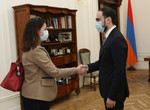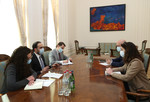Wednesday, 24 February 2021
Tigran Avinyan Receives EBRD Regional Director for Caucasus
On February 24, Deputy Prime Minister Tigran Avinyan met with Catarina Bjorlin Hansen, European Bank for Reconstruction and Development (EBRD) Regional Director for the Caucasus. EBRD Yerevan Office Head Dimitri Gvindadze was in attendance.
The Deputy Prime Minister presented the Government’s short-term and medium-term economic priorities. He highlighted the Government’s Economic Response Program, adopted at the February 4 Cabinet meeting, which seeks to rehabilitate and put the country’s economy on the path of sustainable development. Tigran Avinyan singled out new vectors among the components of the Program, such as the prospects for cultivating technical cannabis and other crops in Armenia, as well as those urban development projects that are underway but have entered an active stage owing to the Economic Response Program.
The investment programs for construction of District 33 (Firdusi) and development of Kond District in Yerevan were discussed in this context. The Deputy Prime Minister emphasized that Kond District will be a fully inclusive project, which will take into account public opinion. A tender for reconstruction of Kond District is expected to be announced in the coming days.
The Deputy Premier next referred to the Engineering City as a successful example of public-private partnership, which is already underway, and a relevant tender will be announced in the near future. The interlocutors exchanged views on the development of the Noragyugh District project and the establishment of academic and innovative quarters in Armenia.
Presenting the Bank’s transactions carried out in Armenia last year, Dimitri Gvindadze noted that they reached a record volume of 160 million euros. The previous two years’ dynamics has been maintained, reaching a record level, with the private sector accounting for about 93% of transactions, which covered the banking sector, energy, natural resources and transport.
The meeting discussed opportunities for joint action in the fields of telecommunications, agriculture, healthcare and others. Reference was made to cooperation over the programs developed by the Government, which seek to increase the private sector’s productivity and competitiveness.










